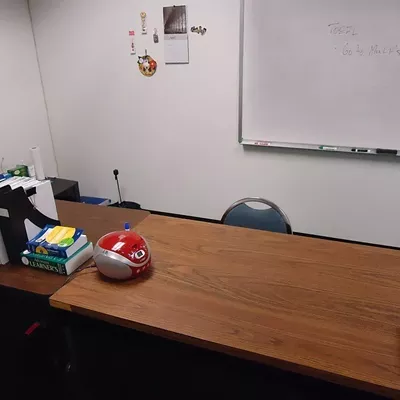Friday, September 22, 2017
Why Teachers Are Leaving (And New Teachers Aren't Replacing Them)
Teacher shortages are a national problem. According to a recent survey, the number one reason teachers give for leaving the profession—55 percent of them—is dissatisfaction. By comparison, financial considerations are cited by 18 percent. Between the top and bottom are Financial/personal reasons, Retirement, and Pursuing another job, in that order.
This isn't new news. It's from the 2012 School and Staffing Survey put together by the National Center for Educational Statistics along with a follow-up survey in 2013. It came up again in a recent panel discussion in Washington DC, and sadly, it's more relevant today than it was five years ago. As with any survey, the numbers are approximate. General dissatisfaction covers low salaries as well as a host of other issues, and in a place like Arizona with its bottom-of-the-barrel salaries, money concerns certainly rank higher than elsewhere.
But as a teacher who retired just when our national obsession with high stakes testing was revving up and class sizes were climbing, I'm certain a growing sense of dissatisfaction pervades the teaching profession, driving many a gifted teacher out of the classroom and making potential new teachers think twice about going into the field of education.
When I went into teaching and began my 30-plus year career, it was because I wanted to teach. I wanted to be part of helping young people learn. I wanted to be part of helping young people grow. I wanted the freedom to shape my curriculum in a way that suited my interests and teaching style so I could maximize my enthusiasm and effectiveness.
And, God, I loved the "Aha!" moment, when a student or a group of students or an entire classroom got it, and it showed on their faces. It was twice as pleasurable when the "Aha!" came from students who weren't used to experiencing moments like that in the classroom. If there's one thing I miss most about teaching, it's that.
I didn't go into education to teach students how to improve their scores on a standardized, fill-in-the-bubble test. I never wanted to be a classroom drill sergeant who puts students through their paces, showing them how to perform on a limited, regimented series of tasks. That's drudgery for the students and for me. Where's the potential for joy, where's the sense of discovery for any of us, student or teacher?
I didn't want the pressure of having my performance as a teacher measured by my students' performance on a high stakes test. There's plenty of genuine pressure on teachers, standing in front of a class full of students every day and trying your damnedest to help them learn. Hitting the scoring mark with students who bring a whole host of problems and needs and gifts into the classroom which should be addressed, except we've got to get through all these drills and pretests so there's no time to deviate from the curriculum set by the need to succeed on the test, that's not the kind of pressure I signed up for.
Did I mention increasing class sizes? I found I could teach to 25 individual students. Give me more than that, and some of them are going to get lost in the crowd — and crowd control becomes a larger part of my job.
Did I mention the campaign to turn the public against teachers, blaming societal problems on the people who see the products of those problems walk into the classroom every day, then see them leave the classrooms and walk back into those same problems? Someone said trying to fix schools without dealing with the problems in the outside world is like trying to clean the air on one side of a screen door. Teachers used to be respected. Until the mid-1990s, when I told people I was a teacher they looked at me with a certain regard, sometimes even reverence. Then it changed. I began hearing what was wrong with teachers, which was pretty much everything. I felt like I was supposed to apologize for . . . for what? For being a teacher, I guess.
I imagine some college students considering what profession to follow, people who might otherwise be inclined to teach, remember the test-driven classrooms they spent so much time in and hear teachers trashed instead of respected, and wonder why in the world they would want to spend their professional lives in that world.
Having said all that, there's a good chance that if I were a college student today, I'd still opt to teach. Fortunately, lots of people feel the same way, but not enough to replace teachers who are leaving.
This isn't new news. It's from the 2012 School and Staffing Survey put together by the National Center for Educational Statistics along with a follow-up survey in 2013. It came up again in a recent panel discussion in Washington DC, and sadly, it's more relevant today than it was five years ago. As with any survey, the numbers are approximate. General dissatisfaction covers low salaries as well as a host of other issues, and in a place like Arizona with its bottom-of-the-barrel salaries, money concerns certainly rank higher than elsewhere.
But as a teacher who retired just when our national obsession with high stakes testing was revving up and class sizes were climbing, I'm certain a growing sense of dissatisfaction pervades the teaching profession, driving many a gifted teacher out of the classroom and making potential new teachers think twice about going into the field of education.
When I went into teaching and began my 30-plus year career, it was because I wanted to teach. I wanted to be part of helping young people learn. I wanted to be part of helping young people grow. I wanted the freedom to shape my curriculum in a way that suited my interests and teaching style so I could maximize my enthusiasm and effectiveness.
And, God, I loved the "Aha!" moment, when a student or a group of students or an entire classroom got it, and it showed on their faces. It was twice as pleasurable when the "Aha!" came from students who weren't used to experiencing moments like that in the classroom. If there's one thing I miss most about teaching, it's that.
I didn't go into education to teach students how to improve their scores on a standardized, fill-in-the-bubble test. I never wanted to be a classroom drill sergeant who puts students through their paces, showing them how to perform on a limited, regimented series of tasks. That's drudgery for the students and for me. Where's the potential for joy, where's the sense of discovery for any of us, student or teacher?
I didn't want the pressure of having my performance as a teacher measured by my students' performance on a high stakes test. There's plenty of genuine pressure on teachers, standing in front of a class full of students every day and trying your damnedest to help them learn. Hitting the scoring mark with students who bring a whole host of problems and needs and gifts into the classroom which should be addressed, except we've got to get through all these drills and pretests so there's no time to deviate from the curriculum set by the need to succeed on the test, that's not the kind of pressure I signed up for.
Did I mention increasing class sizes? I found I could teach to 25 individual students. Give me more than that, and some of them are going to get lost in the crowd — and crowd control becomes a larger part of my job.
Did I mention the campaign to turn the public against teachers, blaming societal problems on the people who see the products of those problems walk into the classroom every day, then see them leave the classrooms and walk back into those same problems? Someone said trying to fix schools without dealing with the problems in the outside world is like trying to clean the air on one side of a screen door. Teachers used to be respected. Until the mid-1990s, when I told people I was a teacher they looked at me with a certain regard, sometimes even reverence. Then it changed. I began hearing what was wrong with teachers, which was pretty much everything. I felt like I was supposed to apologize for . . . for what? For being a teacher, I guess.
I imagine some college students considering what profession to follow, people who might otherwise be inclined to teach, remember the test-driven classrooms they spent so much time in and hear teachers trashed instead of respected, and wonder why in the world they would want to spend their professional lives in that world.
Having said all that, there's a good chance that if I were a college student today, I'd still opt to teach. Fortunately, lots of people feel the same way, but not enough to replace teachers who are leaving.
Tags: Teaching , Teacher shortages , School and Staffing survey , National Center for Educational Statistics













